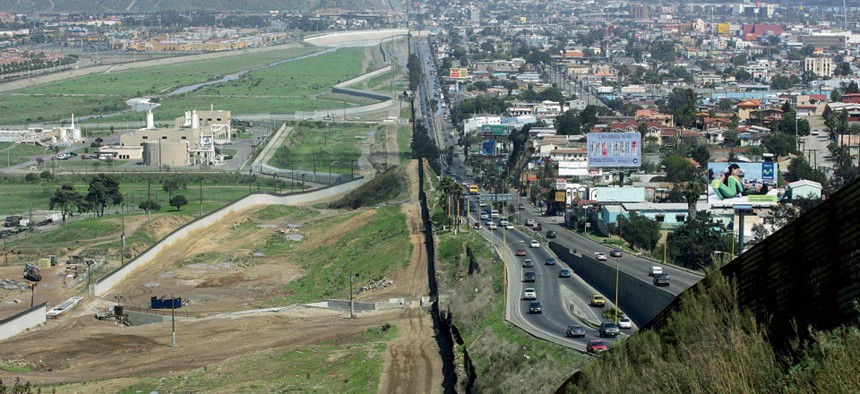
United States Customs and Border Protection
The need for robotic eyes on the border seems like a no-brainer for most lawmakers negotiating immigration reform and border security, but calculating costs and cameras per mile might not prove so easy.
Until directed otherwise by Congress, the Homeland Security Department is moving ahead with a $465 million plan to remotely watch eight areas in Arizona that brush up against Mexico.
The multiyear project aims to dot the state with video surveillance turrets that can spot illegal activity, such as human and drug trafficking. The towers are part of a second attempt at a virtual fence, after an earlier go exhausted
$1 billion. Conceived in 2005, the Secure Border Initiative network was to be a series of one-size-fits-all interconnected
towers flanked with cameras. But the dynamic border environment tripped up the cameras and the project was abandoned in 2011.
This time, DHS officials say they will station towers only where cameras have clear visibility in Nogales, Ariz., and then add more in Sonoita, Douglas, Casa Grande, Ajo and Wellton—for a total of up to 50 towers, funding permitted. A contract is expected to be awarded by the end of the year. Functioning SBInet towers in Tucson and Ajo will remain.
In August, Rep. Mike McCaul, R-Texas, took House colleagues on a tour of the Southwest to show them where surveillance equipment, checkpoints and other border controls are situated. McCaul is chairman of the Homeland Security Committee, which passed border security legislation this year.
The bill McCaul sponsored would leave decisions about where to place border equipment up to experts from all levels of government who know best how much is needed and where, committee aides say.
For years, “resources have dictated the strategy instead of a strategy dictating what resources are provided,” McCaul told Government Executive in an email. His measure would require DHS to create a national strategy for gaining control of the border.
Right now, “we have patched up individual holes—causing illegal immigration to shift to less fortified sectors instead of stopping it altogether,” McCaul says. San Diego uses fences. Arizona uses drones and surveillance cameras on poles. And in Texas, there is a lot of unsecured space.
“The fence in the San Diego sector has pushed illegal immigrants off the California coast through our maritime borders, and advanced technology and increased enforcement in the Tucson sector has caused apprehensions to skyrocket in the Rio Grande Valley,” he says. “Today, even the most fortified sectors are full of gaping holes.”
Everything in the legislation is wrapped around achieving a 90 percent apprehension rate, aides say. By drawing up a plan first, the thinking goes, lawmakers will know which tools are necessary to get there.
“The national strategy must be presented to the Congress—using technology, fencing and manpower, and with input from local communities, ranchers and landowners,” as well as government officials, McCaul says. “If Congress sees capability gaps in the plan, we will demand changes.”
Not all of the new surveillance tools would require new funding. By redeploying unarmed military drones and robots brought back from Iraq and Afghanistan, Homeland Security could acquire additional gear at no additional cost—except for shipping fees.
On the Senate side, lawmakers already have settled on a recipe for gadgets and gizmos to tighten border control. Comprehensive immigration legislation passed in June calls for 50 integrated fixed towers in Arizona, more than 30 in Texas and three in San Diego. Other equipment would include 205 handheld thermal imaging systems or night vision goggles for the Rio Grande Valley and 19 license plate readers in Laredo, Texas. Combined with law enforcement and fencing costs, the border security tab for the Senate plan would be $46 billion.
Some former federal immigration officials have voiced concerns that the technology proposals will duplicate ongoing efforts, like the virtual fence.
Doris Meissner, who was commissioner of the Immigration and Naturalization Service during the Clinton administration, says lawmakers are overlooking DHS’ accomplishments in high-tech surveillance during the past five years—accomplishments taxpayers have already paid for.
“There is such a great deal of investment that has already taken place along the border, with a tremendous amount of support, bipartisan support, through the appropriations process,” says
Meissner, now a senior fellow at the nonpartisan Migration Policy Institute. “SBInet really failed, and it was a very large expenditure of money, most of which didn’t pay off. But they did learn from it, and they have since been employing these technologies that are available on the market.”
Plus, Congress better provide more human eyes in the courthouses to keep up with what the robotic eyes are observing, some immigration attorneys say.
“Sequestration is already harming our courts here. Who is going to be available to defend or prosecute all of the illegal entry cases? What I see is disjointed optical placations,” says
Kathleen Campbell Walker, an El Paso-based lawyer with Cox Smith.
NEXT STORY: America’s Other 1 Percent







